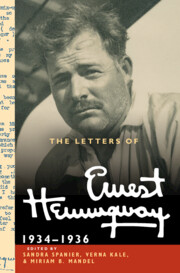1913 results
Abbreviations and Short Titles
-
- Book:
- The Letters of Ernest Hemingway
- Published online:
- 16 May 2024
- Print publication:
- 16 May 2024, pp -
-
- Chapter
- Export citation
Plates
-
- Book:
- The Letters of Ernest Hemingway
- Published online:
- 16 May 2024
- Print publication:
- 16 May 2024, pp 1-16
-
- Chapter
- Export citation
Appendix Calendar of Letters
-
- Book:
- The Letters of Ernest Hemingway
- Published online:
- 16 May 2024
- Print publication:
- 16 May 2024, pp -
-
- Chapter
- Export citation
Index of Recipients
-
- Book:
- The Letters of Ernest Hemingway
- Published online:
- 16 May 2024
- Print publication:
- 16 May 2024, pp -
-
- Chapter
- Export citation
General Index
-
- Book:
- The Letters of Ernest Hemingway
- Published online:
- 16 May 2024
- Print publication:
- 16 May 2024, pp -
-
- Chapter
- Export citation
Contents
-
- Book:
- The Letters of Ernest Hemingway
- Published online:
- 16 May 2024
- Print publication:
- 16 May 2024, pp -
-
- Chapter
- Export citation
The Letters June 1934–June 1936
-
- Book:
- The Letters of Ernest Hemingway
- Published online:
- 16 May 2024
- Print publication:
- 16 May 2024, pp -
-
- Chapter
- Export citation
Chronology
-
- Book:
- The Letters of Ernest Hemingway
- Published online:
- 16 May 2024
- Print publication:
- 16 May 2024, pp -
-
- Chapter
- Export citation
List of Plates
-
- Book:
- The Letters of Ernest Hemingway
- Published online:
- 16 May 2024
- Print publication:
- 16 May 2024, pp -
-
- Chapter
- Export citation
Note on the Text
-
- Book:
- The Letters of Ernest Hemingway
- Published online:
- 16 May 2024
- Print publication:
- 16 May 2024, pp -
-
- Chapter
- Export citation
Maps
-
- Book:
- The Letters of Ernest Hemingway
- Published online:
- 16 May 2024
- Print publication:
- 16 May 2024, pp -
-
- Chapter
- Export citation
Appendix Of Earlier Letters
-
- Book:
- The Letters of Ernest Hemingway
- Published online:
- 16 May 2024
- Print publication:
- 16 May 2024, pp -
-
- Chapter
- Export citation
Frontmatter
-
- Book:
- The Letters of Ernest Hemingway
- Published online:
- 16 May 2024
- Print publication:
- 16 May 2024, pp -
-
- Chapter
- Export citation
Calendar of Letters
-
- Book:
- The Letters of Ernest Hemingway
- Published online:
- 16 May 2024
- Print publication:
- 16 May 2024, pp -
-
- Chapter
- Export citation
Introduction to the Volume
-
- Book:
- The Letters of Ernest Hemingway
- Published online:
- 16 May 2024
- Print publication:
- 16 May 2024, pp -
-
- Chapter
- Export citation
List of Maps
-
- Book:
- The Letters of Ernest Hemingway
- Published online:
- 16 May 2024
- Print publication:
- 16 May 2024, pp -
-
- Chapter
- Export citation
Acknowledgments
-
- Book:
- The Letters of Ernest Hemingway
- Published online:
- 16 May 2024
- Print publication:
- 16 May 2024, pp -
-
- Chapter
- Export citation
General Editor’s Introduction
-
- Book:
- The Letters of Ernest Hemingway
- Published online:
- 16 May 2024
- Print publication:
- 16 May 2024, pp -
-
- Chapter
- Export citation
Roster of Correspondents
-
- Book:
- The Letters of Ernest Hemingway
- Published online:
- 16 May 2024
- Print publication:
- 16 May 2024, pp -
-
- Chapter
- Export citation

The Letters of Ernest Hemingway
-
- Published online:
- 16 May 2024
- Print publication:
- 16 May 2024

